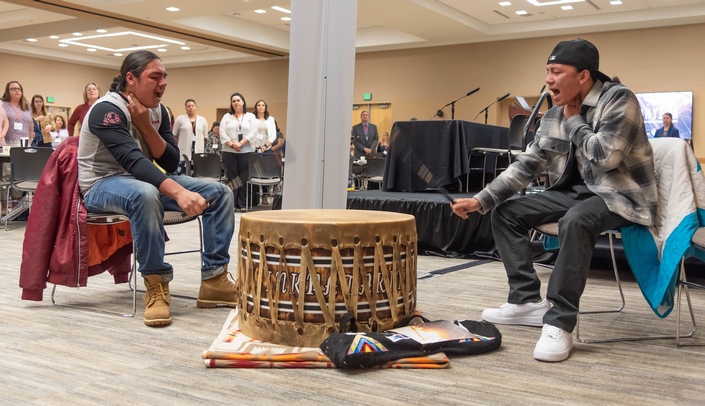The beat of the drums resounded through the air and swelled the room. Before long, hearts began to synchronize with the two drummers from the group Upstream.
Handed down over generations, the beat and the welcome song performed for the opening of the April 24 Wakanyeja Conference had one purpose – to unify everyone under one goal. The goal – begin and sustain a conversation about behavioral health issues among American Indians.
Eleven distinguished speakers representing eight tribes shared their experiences at the 2019 Great Plains Symposium sponsored by UNMC and the Center for Great Plains Studies at the University of Nebraska-Lincoln.
View a Flickr album of conference photos.
Without exception, the speakers emphasized that it was impossible to address the current problem without acknowledging the past. But, it had to be an honest review of the past.
It’s a past filled with stories of deliberate, intentional acts of murder, genocide and perpetual trauma the non-indigenous has committed upon the indigenous peoples of North America. The speakers called it ongoing intergenerational trauma.
There were tales of theft of land, culture, language, health and life – a history of trauma that has persisted through generations due to assimilation and acculturation.
Don Warne, M.D., Oglala, director of Indians into Medicine, and associate dean of diversity, equity and inclusion at the University of North Dakota has seen 244 American Indian health professionals graduate through his program.
“It is a testament to the strength of our people that we have persevered despite all that we have been through,” he said.
A timeline of abuses was reviewed, from 1790 when Jeffery Amherst committed the first act of bioterrorism by handing out blankets contaminated with the smallpox virus, to the 1830 Trail of Tears, and the harsh and sometimes deadly conditions forced on children at boarding schools.
“Today, the average age of death among men on the Pine Ridge Reservation is 48,” Dr. Warne said. “American Indians have the highest rates of suicide of any racial/ethnic group in the U.S. This is the legacy of our history.”
Lakota American and storyteller, Joseph Marshall III, said the traditional village provided everyone with a sense of purpose. “We need to decolonize and reconnect with our values,” he said. “We cannot forget who we are and where we’re going.”
As the conference drew to an end, the consensus was, like the drum beat, in one voice – let’s take what we’ve learned and implement change and healing within our own communities.

Is this conference held yearly and if so do you have dates for next year or an email list I can subscribe to? Thank you